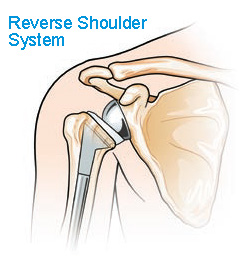
Reverse shoulder replacement is considered as an alternative to traditional shoulder replacement when the rotator cuff is so damaged that it would not be able to support a traditional joint replacement.
In traditional shoulder replacement, the parts of the shoulder that have “worn out” are replaced with new parts that have the ability to function smoothly. The parts of the bones that rub together are replaced with metal and plastic parts.
The same is true with reverse shoulder replacement, except that the part of the arm bone and shoulder blade that serve as the ball and socket are reversed. In reverse shoulder surgery, the “ball” is attached to the shoulder blade, and the “socket” is attached to the upper arm. This enables your deltoid muscle to compensate for the damaged rotator cuff. Using the deltoid in this manner provides increased stability, strength, and range of motion to the shoulder joint.
Zimmer’s Reverse Shoulder Systems
Zimmer’s Reverse Shoulder Systems are based on the proven principle of reversing the normal relationship between the shoulder blade and arm with the goal of increasing the role of the deltoid muscle. This aids in the restoration of normal function for patients suffering from loss of rotator cuff function and severe osteoarthritis.
How Will I Know If I Should Have Reverse Shoulder Replacement?
Your orthopedic surgeon will perform a very thorough examination of your shoulder. This will include a test of the muscles and tendons to determine how much strength and range of movement you have.
In addition, your surgeon will take X-rays, a CT scan (computed tomography), or an MRI (magnetic resonance imaging), which will be used to further assess the condition of your shoulder joint and determine if you are a candidate for reverse shoulder replacement surgery. Although reverse shoulder replacement surgery is a proven approach to restoring motion and reducing shoulder pain, it is a major surgical procedure and should be considered only when all other treatment options have failed.
What Risks are Involved?
Like any surgery, it is important to understand the risks involved with reverse shoulder replacement. There are potential complications both during and after surgery. Generally, these include infection, blood clots, implant loosening, and nerve damage. Talk to your doctor about your specific situation.
Your results will depend on your personal circumstances. How long a shoulder replacement will last varies from patient to patient. It depends on many factors, such as physical conditions, activity level, body weight, and the surgical technique. Replacement joints are not as strong or durable as natural, healthy joints, and there is no guarantee that a prosthetic joint will last the rest of a patient’s life. If you choose to have surgery, talk to your doctor about appropriate activities to take care of your new joint and how to make it last as long as possible. All shoulder replacements may need to be replaced at some point.
